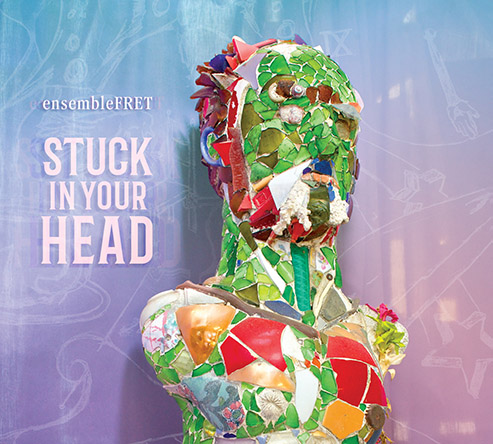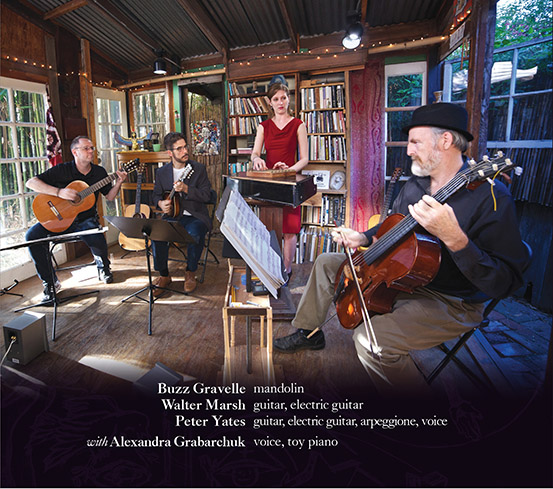
ensembleFRET's Debut CD
Stuck
In Your
Head
Available Now at CD Baby Here
also available on iTunes, Spotify, and all the usual sites
Buzz Gravelle - mandolin
Walter Marsh - guitar, electric guitar
Peter Yates - guitar, electric guitar, arpeggione, voice
with Alexandra Grabarchuk - voice, toy piano
full bios here
Did you ever want to hear music that was serious yet also fun? We did, so we made this new CD. To get it done, we had to use acoustic and electric guitars, mandolin, bowed guitar, toy piano, foot percussion and sage/sassy contributions from guest singer Alexandra Grabarchuk. The resulting program of seven selections turned out not to be confusable with much else. Proceedings begin with Theodore Norman's "From the 60s" – bent versions of popular dance tunes featuring his mix of seriousness, possibility and wit. They are followed by recent works composed in the same spirit by members of the group. Buzz Gravelle's electric quartet mind-expands a Charlie Christian solo into a seven-minute evolving groove. Walter Marsh throws into bed a pair of famous movie themes, where they surprise us by engaging in wild yet sincere 12-tone coupling. Peter Yates revisits seven folksongs that since childhood have been stuck in our heads, zeroing in on their addictive elements and hammering them even deeper into the brain. California composers Garry Eister and Jonathon Grasse add seductive sleepscapes and Brazilian ruminations. Even Paul Hindemith is caught in a light mood for a reflective nod to the deep past of 1925.
Walter Marsh - guitar, electric guitar
Peter Yates - guitar, electric guitar, arpeggione, voice
with Alexandra Grabarchuk - voice, toy piano
full bios here
Did you ever want to hear music that was serious yet also fun? We did, so we made this new CD. To get it done, we had to use acoustic and electric guitars, mandolin, bowed guitar, toy piano, foot percussion and sage/sassy contributions from guest singer Alexandra Grabarchuk. The resulting program of seven selections turned out not to be confusable with much else. Proceedings begin with Theodore Norman's "From the 60s" – bent versions of popular dance tunes featuring his mix of seriousness, possibility and wit. They are followed by recent works composed in the same spirit by members of the group. Buzz Gravelle's electric quartet mind-expands a Charlie Christian solo into a seven-minute evolving groove. Walter Marsh throws into bed a pair of famous movie themes, where they surprise us by engaging in wild yet sincere 12-tone coupling. Peter Yates revisits seven folksongs that since childhood have been stuck in our heads, zeroing in on their addictive elements and hammering them even deeper into the brain. California composers Garry Eister and Jonathon Grasse add seductive sleepscapes and Brazilian ruminations. Even Paul Hindemith is caught in a light mood for a reflective nod to the deep past of 1925.
photo by Felix Salazar (http://www.felixsalazar.com)
CD Program Notes
1-8. Theodore Norman - From the 60s
When he wasn't writing gestural, atonal chamber music, Theodore Norman indulged his other knack of reconsidering popular forms such as tango or boogie-woogie. Filtered through his sensibility, these came out sounding more like what they had been trying to be all along. Transcribed by Peter, these examples were originally for guitar solo, duo, trio or quartet. Together, they make a sock-hop version of the Baroque dance suite, updated to the 60s and relocated to Mars. Just as wit is not satire, transformation is the only true homage.
9. Buzz Gravelle - Zero’s Vinyl
This piece was inspired by a few measures of a Charlie Christian guitar solo from the song Seven Come Eleven, as recorded with the Benny Goodman Sextet in 1939. This excerpt was deconstructed, re-assembled and expanded. Originally written as a trio for mandolin, guitar and arpeggione, Zero's Vinyl is here presented in a version for two electric guitars and mandolin. With its kinetic energy and unrelenting propulsion, it’s fun to play – the musical equivalent of a ride in a fast car.
– Buzz Gravelle
10. Paul Hindemith - Rondo
This touches back to one of the first works ever written for guitar ensemble. Hindemith initially intended this trio as the middle piece of the cantata Wanderlieder, commissioned by Tage für Neue Musik Berlin (Berlin Days of New Music) under the motto of Spiele und Lieder für Kinder (Games and Songs for Children). In 1938, the composer had to leave his manuscripts behind in Germany, but later remembered the little piece when making a note of unprinted pieces.
11-13. Walter Marsh - Tonegrafts 1-3
Each of these short works grafts the same twelve-tone row onto different musical stock. The first grafts the row to a simple plan of four-bar cells in 3/8. In the second, the graft is to Moon River and Somewhere Over the Rainbow, inspired by an imagined, odd combination of Dorothy Gale and Holly Golightly. The third grafts the row onto stock from Franz Joseph Haydn. – Walter Marsh
14. Garry Eister - Sleep Another Night
Sleep Another Night began as a lullaby, though it lost some of that quality as I worked on it. Still, near the end of the piece one hears the melodic shape of the words "Down will come baby, cradle and all," and before that, the shape of "Rockabye, baby" in the arpeggione. On discussing the instrument with me, Peter remarked that a friend said that if one doesn't write some arpeggios for the arpeggione, what's the point of using it? I therefore wrote a brief arpeggiating solo for the arpeggione followed by a series of arpeggiated chords that accompany a series of rising arpeggiated guitar chords which would serve as the climax of the piece, if it had one. Instead, it falls asleep. (View the Sleep Another Night video here)
– Garry Eister
15. Jonathon Grasse - Sete Letras
“Seven Letters” is also the seventh work I've composed with Peter and his adventurous musical collaborators in mind. A hearing of ensembleFRET at his annual Summer Solstice Fest included the magical infusion of Alexandra’s voice and distinctive musicality. That evening she played toy piano and sang a number in Portuguese, nailing the intricacies of that language’s subtle nuances. The idea for Sete Letras was born. My ethnomusicological work has explored Brazilian music and a history haunted by colonialism and Portuguese cultural roots. A recent stay in Lisbon provided a taste of fado, Portugal’s often dark, dreamy musical landscape of “fate” and longing. The Portuguese poet Dom António de Bragança (1895-1964), many of whose works were fashioned into fado classics, penned Sete Letras to show the admittedly romantic correlation between the heart (coração) and the longing of the soul (saudade).
– Jonathon Grasse
16-22. Peter Yates - Stuck In Your Head
These seven folksongs are stuck in the brains of many, having darted in during childhood. Each of these versions finds its song's signature element and fixates on it, as though trying to understand the barb that keeps the dart from coming out. The two principal players have to sing and play simultaneously, in the manner of a revival meeting. The supernatural claims of the world's religions disagree and cancel out, leaving only the sounds of observance as the essence of spiritual practice.
– Peter Yates

